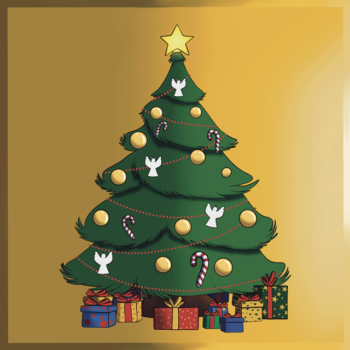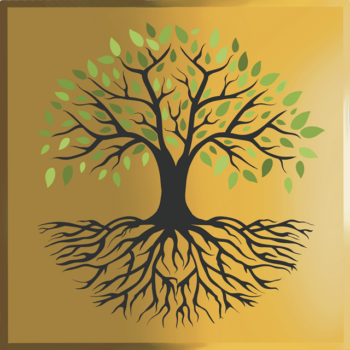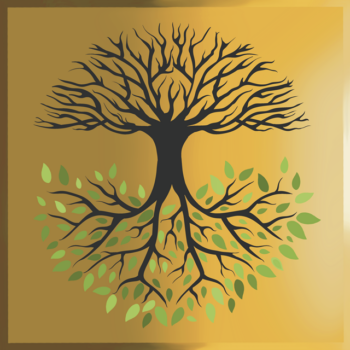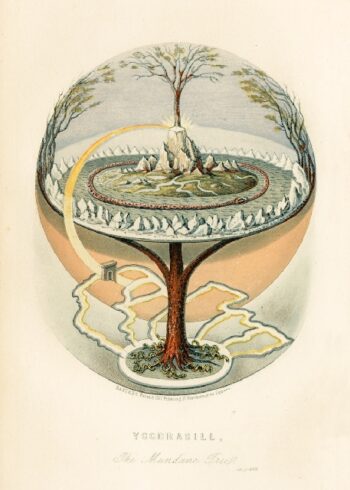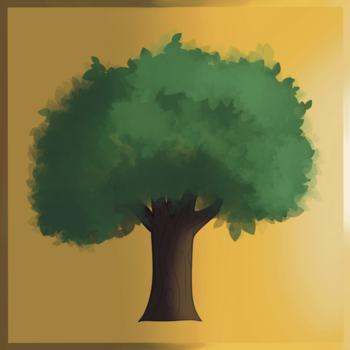Definition:
The “Fall of Man” is a fictional story that refers to the biblical event described in the Book of Genesis, where the first humans, Adam and Eve, disobey God’s command and eat the forbidden fruit from the Tree of the Knowledge of Good and Evil in the Garden of Eden. This act of disobedience leads to the introduction of sin, suffering, and death into the world, marking humanity’s fall from a state of innocence and perfect communion with God.
Etymology:
The term “fall” signifies a decline from a higher state. “Man” in this context represents humanity as a whole, derived from the Old English word “mann,” meaning person.
Description:
The story of the Fall of Man is supposed to be a profound narrative about trust, authority, and the consequences of disobedience.
God, as the all-knowing and all-powerful creator of the universe, designed every event with purpose. He could have chosen differently but deliberately set the events in motion as they unfolded.
God created Adam and Eve and placed them in the Garden of Eden, surrounding them with trees bearing fruit. Among these were two significant trees: the Tree of Life, which granted immortality and divine knowledge, and the Tree of the Knowledge of Good and Evil, from which God explicitly commanded them not to eat. In Genesis 2:16-17, God says: “Of every tree of the garden thou mayest freely eat: But of the Tree of the Knowledge of Good and Evil, thou shalt not eat of it: for in the day that thou eatest thereof thou shalt surely die.”
However, the serpent, described as a cunning creature, challenged God’s warning by telling Eve, “You will not certainly die” (Genesis 3:4). The serpent never actually commanded Eve to eat the forbidden fruit but instead revealed information that God had withheld. In Genesis 3:5, the serpent says, “For God knows that when you eat from it your eyes will be opened, and you will be like God, knowing good and evil.” This statement, later confirmed by God, was true. Eve, tempted by knowledge, ate the fruit and shared it with Adam. Contrary to God’s threat, they did not die upon eating the fruit. Instead, they were banished from Eden, severing their relationship with God. This implies that God’s warning of death was misleading, and the serpent’s statement was accurate.
In this context, many interpret “death” to mean “spiritual death,” which is common in Biblical language. However, if God says something with a literal meaning but intends it metaphorically, that would be a lie. Since God actually cuts off His relationship with them, saying that He meant “spiritual death,” the threat would be accurate—though it is even more likely that “death” had a double meaning.
God’s response was to punish them with mortality by barring their access to the Tree of Life, which sustained their immortality. Based on the idea that Adam and Eve were no longer immortal, many believers interpret this as the actual meaning of God’s death threat. However, God never clarified that their continued immortality depended on eating from the Tree of Life. His statement that they would “surely die” only became apparent after their banishment. Now mortal, Adam and Eve had no proof or evidence they were ever immortal.
It’s important to notice what God actually said: “for in the day that thou eatest from the Tree of Knowledge thereof thou shalt surely die.” The key phrase here is “in the day.” If we read the threat literally, God is not suggesting that they will simply lose their immortality. Because that would imply they would die far into the future—about 930 years later, according to the Bible. Rather, it’s clear that God means they will literally die on the same day they eat the fruit.
The placement of both the Tree of Life and the Tree of Knowledge in Eden was a deliberate test of obedience and trust in God’s authority. Yet, without the knowledge of good and evil, Adam and Eve lacked the moral awareness to make a truly moral decision. Faith in God’s authority was the intended lesson, not the understanding of morality. God offered no explanation for His command, expecting faith. Believers often compare this situation to examples such as a child being told not to touch a hot stove, but this is flawed. Children instinctively investigate, questioning claims rather than blindly trusting, especially over an eternity.
The argument that God deserved their trust because He created and nurtured them is weak. Many parents, despite giving life to their children, can be untrustworthy or abusive. Kindness is the most common tool for manipulation, demonstrating that trust based solely on provision is unreliable.
Moreover, Adam and Eve had no reason to distrust the serpent. The serpent presented itself as wise and did not issue threats but offered an alternative perspective. Its question, “Did God really say…?” planted reasonable doubt. In contrast, God’s command was accompanied by the threat of death without explanation. It’s not fair to say that God was merely warning them about natural consequences; it was God’s design to place the Tree of Knowledge there.
After their disobedience, God blocked access to the Tree of Life, allegedly to prevent eternal life in a fallen state. This act of physically guarding the Tree of Life mirrors how God initially commanded Adam and Eve not to eat from the Tree of Knowledge. Essentially, God’s verbal command served as a form of protection over the Tree of Knowledge, just as His later physical barrier protected the Tree of Life. This equivalence suggests that God’s authority was enforced through both instruction and action, raising questions about why He chose to guard one tree physically but only verbally warned against the other.
Additionally, the Bible does not state whether Adam and Eve ever ate from the Tree of Life or whether continual eating was necessary for eternal life. Either way, if eating from it supposedly made them immortal, then by definition, it should have been impossible for them to ever die. It is self-contradictory for an immortal being to become mortal because, by definition, someone immortal who becomes mortal was never truly immortal.
Christianity expanded on this narrative, introducing the concept of original sin—that all humans inherit Adam and Eve’s sin. This idea implies that all people are born in sin and face eternal punishment unless they accept Jesus Christ as their savior. Furthermore, the doctrine of the divine plan suggests that God orchestrated all events, including Adam and Eve’s disobedience, rendering free will an illusion. God placed the forbidden tree, knowing they would eat from it, setting humanity on a path of suffering and separation.
In conclusion, the story of the Fall of Man reveals contradictions in God’s warnings and actions. Adam and Eve were expected to trust God without reason, while the serpent provided a logical alternative. God’s punishment appears premeditated, raising questions about free will, morality, and divine authority.
Looking over the story, it becomes evident that the correct course of action for Adam and Eve would have been to neither eat from the Tree of Life nor the Tree of Knowledge. They should have simply continued to eat from the rest of the fruit in the garden, avoiding both these trees entirely. But they were clearly tricked by God…
Articles:
Belief
Definition: “Belief” is to accept something as accurate without proof. “Faith” is to accept something as accurate even when you have proof to the contrary. Etymology: The word “believe” originates…
Symbolism:
Articles:
Christmas Tree
Definition: A “Christmas tree” is an evergreen tree, often a fir, spruce, or pine, decorated with lights, ornaments, tinsel, and other Christmas decorations. Etymology: The term “Christmas tree” combines “Christmas,”…
The Tree of Life
Definition: “The Tree of Life” is a fictional concept and typically refers to a symbolic tree in various religions. Etymology: The term “Tree of Life” comes from the concept of…
The Tree of the Knowledge of Good and Evil
Peter Paul Rubens – The Fall of Man (1628-1629). Charles Joseph Natoire – The Rebuke of Adam and Eve (1740). Definition: “The Tree of the Knowledge of Good and Evil,”…
The World Tree
Oluf Olufsen Bagge – Yggdrasil, The Mundane Tree (1847). “The World Tree” is illustrated as a massive tree holding up the world with its three branches. The world is inside…
Tree
Definition: A “tree” is a large perennial plant that typically has a trunk supporting branches and leaves. Etymology: The word “tree” comes from the Old English “trēow,” which is related…
Religion:
The primary source for the Fall of Man is:
- The Bible, Genesis 3:
- Genesis 3:1-7: The temptation and eating of the forbidden fruit.
- Genesis 3:8-13: Adam and Eve hide from God and confess their disobedience.
- Genesis 3:14-19: God pronounces curses on the serpent, Eve, and Adam.
- Genesis 3:20-24: Adam names his wife Eve, God makes garments for them, and they are expelled from Eden.
The texts from the Bible (NIV):
- Genesis 3:1-7:
- 1 Now the serpent was more crafty than any of the wild animals the Lord God had made. He said to the woman, “Did God really say, ‘You must not eat from any tree in the garden’?”
- 2 The woman said to the serpent, “We may eat fruit from the trees in the garden,
- 3 but God did say, ‘You must not eat fruit from the tree that is in the middle of the garden, and you must not touch it, or you will die.’”
- 4 “You will not certainly die,” the serpent said to the woman.
- 5 “For God knows that when you eat from it your eyes will be opened, and you will be like God, knowing good and evil.”
- 6 When the woman saw that the fruit of the tree was good for food and pleasing to the eye, and also desirable for gaining wisdom, she took some and ate it. She also gave some to her husband, who was with her, and he ate it.
- 7 Then the eyes of both of them were opened, and they realized they were naked; so they sewed fig leaves together and made coverings for themselves.
- Genesis 3:8-13:
- 8 Then the man and his wife heard the sound of the Lord God as he was walking in the garden in the cool of the day, and they hid from the Lord God among the trees of the garden.
- 9 But the Lord God called to the man, “Where are you?”
- 10 He answered, “I heard you in the garden, and I was afraid because I was naked; so I hid.”
- 11 And he said, “Who told you that you were naked? Have you eaten from the tree that I commanded you not to eat from?”
- 12 The man said, “The woman you put here with me—she gave me some fruit from the tree, and I ate it.”
- 13 Then the Lord God said to the woman, “What is this you have done?” The woman said, “The serpent deceived me, and I ate.”
- Genesis 3:14-19:
- 14 So the Lord God said to the serpent, “Because you have done this,“Cursed are you above all livestock and all wild animals! You will crawl on your belly and you will eat dust all the days of your life.
- 15 And I will put enmity between you and the woman, and between your offspring and hers; he will crush your head, and you will strike his heel.”
- 16 To the woman he said, “I will make your pains in childbearing very severe; with painful labor you will give birth to children. Your desire will be for your husband, and he will rule over you.”
- 17 To Adam he said, “Because you listened to your wife and ate fruit from the tree about which I commanded you, ‘You must not eat from it,’“ Cursed is the ground because of you; through painful toil you will eat food from it all the days of your life.
- 18 It will produce thorns and thistles for you, and you will eat the plants of the field.
- 19 By the sweat of your brow you will eat your food until you return to the ground, since from it you were taken; for dust you are and to dust you will return.”
- Genesis 3:20-24:
- 20 Adam named his wife Eve, because she would become the mother of all the living.
- 21 The Lord God made garments of skin for Adam and his wife and clothed them.
- 22 And the Lord God said, “The man has now become like one of us, knowing good and evil. He must not be allowed to reach out his hand and take also from the tree of life and eat, and live forever.”
- 23 So the Lord God banished him from the Garden of Eden to work the ground from which he had been taken.
- 24 After he drove the man out, he placed on the east side of the Garden of Eden cherubim and a flaming sword flashing back and forth to guard the way to the tree of life.
